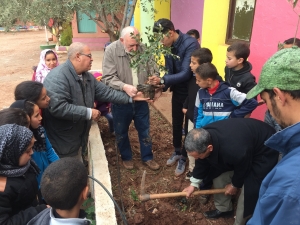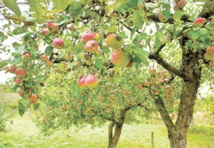By Errachid Montassir
HAF Project Manager
The growth of sustainable development as a mainstream concept and practice in Morocco has been progressing but not as much as most people (particularly rural, and women and youth everywhere) have hoped. Morocco has progressive and helpful laws and programs that give the opportunity and responsibility to all communities to participate in planning, manage initiatives, and build proposals for development projects. Projects then will naturally be different depending on the priorities of youth, women, and farmers’ needs, consistent with the new vision of decentralization which plays an important role of making each community involved in its own projects and responsible for working through the challenges. Yet, implementation faces considerable obstacles for local communities to apply participatory development (without them having practical prior experiences as to how) and to create project proposals for funding by government and private agencies.
The High Atlas Foundation (HAF) has a wide network, partnering with seven universities in Morocco, implementing capacity-building in development planning and management with students, and advancing local participation in planning and implementing socio-economic projects. We do this together by way of experientially training students, faculty, members of civil society, elected officials, government technicians, community leaders, and citizens. HAF’s partnerships with universities in Morocco has achieved effective skills-building with more than 2,000 students in the areas of needs assessment for community action planning, organizational development, and project management.
During the month of March 2018, culture, history, and sustainable development were are brought together by HAF in its organization of workshops on participatory planning for projects with 122 students at the Faculty of Human Science and Literature, at Cadi Ayyad University (UCA). UCA has once again been designated the leading higher learning institution in Morocco, the Maghreb region, and “Francophone” parts of Africa at-large, according to a recent university ranking published by the London-based, Times Higher Education.
The objectives of the workshops are those of sustainable development: building knowledge and skills with students with the aim of enhacing their morale, agency, and enduring productivity on behalf of themselves and communities.
With facilitation by Dr. Yossef Ben-Meir, president of the High Atlas Foundation, the first workshop was launched on 11 March 2018, starting with discussion of the Moroccan development frameworks for participatory action, which was a central point between the students and HAF’s team. As His Majesty the King Mohammed VI insightfully stated at the Johannesburg Conference 2002, that “after the different tremors and the violent crises which shook the world recently, is everybody convinced now that fostering sustainable development is everyone’s responsibility.”
The 122 students experienced the participatory method–pairwise-ranking–and other methods of the community planning, which enable not only students, but all people to play an active and influential part in decisions which impact their lives. All the students were wonderfully involved in making decisions by coming to consensus on their project priorities, which are as follow:
– The system managment of administration: this plays an essential role in letting the relations between the university administration and the students to be transparent with greater open communication.
– Health care: the main point is to improve quality student health at the university, and to cover its associated costs.
– Electronic library: this will be very helpful for the students to much more easily discover informative sources.
The HAF is always following up with communities, youth, women, and cooperatives to evaluate and advance on all the steps of development projects. On Sunday, 25 March 2018, the HAF came back to assess the students’ practices and what they have learned through the first session, and to organize for action. During a great morning, Dr. Ben-Meir opened the second part of the workshop that brought new students to learn about HAF’s participatory approach. All the students were able to follow up with the priorities of the first session. They also divided into 3 groups, and each group built their team and solutions for their projects, such as the strategy to create more clubs and majors at the University.
Before HAF delivered 122 Certificates of Completion to the students, the workshops ended with a fruitful discussion about the future upcoming training with the UCA students, which is an international program called “Imagine” for women to create the life they most want.
The certificates deliverd to the UCA students is a recognition of their dedications to sustainable community development and spreading the culture of collaboration. “I must hug you [Dr. Yossef Ben-Meir] and thank a lot the High Atlas Foundation about this such wonderful chance to realize that we really have communities, and that we should care and help in developing them,” one of the UCA students expressed.
An essential basis for development in Morocco is the agency of university students. They are current and future leaders who play a fundamental role in developing their country.
HAF continues to expand the participatory approach among Moroccan students and communities…




